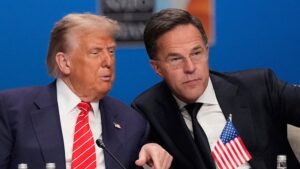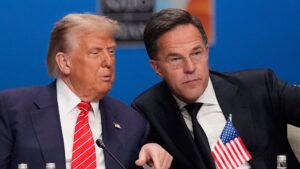
Francesca Albanese, United Nations Special Rapporteur on the situation of human rights in the Palestinian territories, gives a statement after meeting with the Slovenian parliament's Friendship Group with Palestine, in Ljubljana, on July 10, 2025. The US Secretary of State on July 9 announced Washington was sanctioning Albanese following her criticism of Washington policy on Gaza. (Photo by Jure Makovec / AFP)
The United States has imposed sanctions on Francesca Albanese, a UN special rapporteur on the occupied Palestinian territories. This decision, announced by Marco Rubio, the US Secretary of State, comes in response to Albanese’s outspoken criticism of Israel, which US officials claim constitutes a threat to the sovereignty of both the United States and Israel.
Albanese, an Italian human rights lawyer affiliated with Georgetown University, is known for her vocal anti-Israel stance. In her writings, including a book titled J’Accuse released shortly after the October 7, 2023 Hamas attack, she accused Israel of engaging in settler-colonialism, genocide, and apartheid. While she condemned the violence of Hamas, she characterized the attack as a “natural” reaction to Israeli governance and dismissed Israel’s right to self-defense.
The sanctions against Albanese reflect an escalating tension between the US and the UN’s human rights mechanisms, particularly those involving the Israeli-Palestinian conflict. Rubio stated that Albanese’s views are so biased that they undermine the integrity of the UN’s mission and pose a danger to US interests.
While the US government’s decision to sanction Albanese aligns with its broader strategy of confronting perceived anti-Israel sentiment, critics argue that the action is excessive. They contend that imposing sanctions for expressions of opinion undermines the principles of free speech that the US champions. This perspective raises important questions about the balance between supporting free expression and addressing what is viewed as dangerous rhetoric.
Albanese’s influence, while significant among certain activist circles, is seen by many as limited. Her reports and public statements, characterized by partisanship, primarily resonate within a specific ideological framework. Observers note that sanctioning her may inadvertently elevate her profile and credibility among those who share her views, potentially counteracting the intended effect of the sanctions.
Critics of the sanctions also highlight the importance of reserving such measures for individuals who engage in severe wrongdoing, such as direct involvement in aggression or crimes against humanity. The decision to sanction someone like Albanese, whose actions are viewed as largely rhetorical, risks devaluing the meaning of sanctions in international relations.
In light of these developments, some argue that the US should reconsider its approach to individuals like Albanese. Ignoring or challenging her views in a constructive manner may be more effective than imposing sanctions that could enhance her visibility and perceived importance in the global discourse.
As the US navigates its foreign policy, especially concerning the contentious Israeli-Palestinian conflict, the implications of actions like these will resonate beyond immediate political circles. The Biden administration faces pressure to demonstrate its stance on human rights, yet it must also weigh the long-term consequences of its decisions on the international stage.







